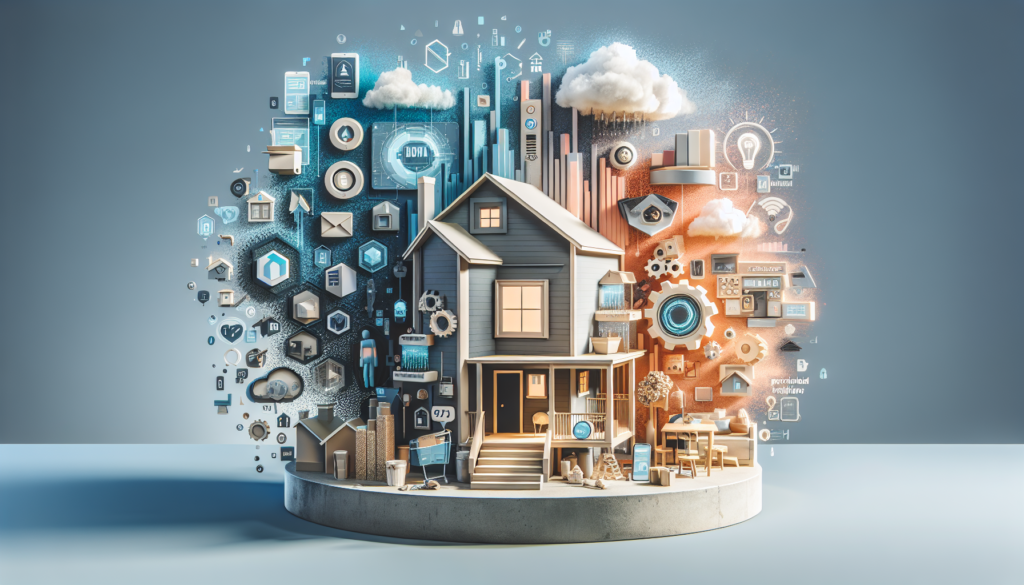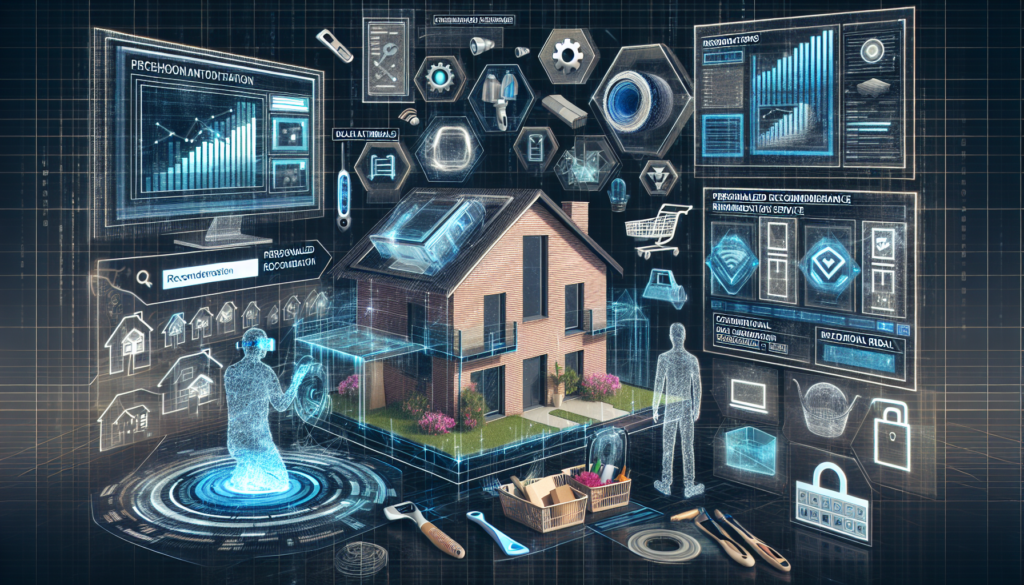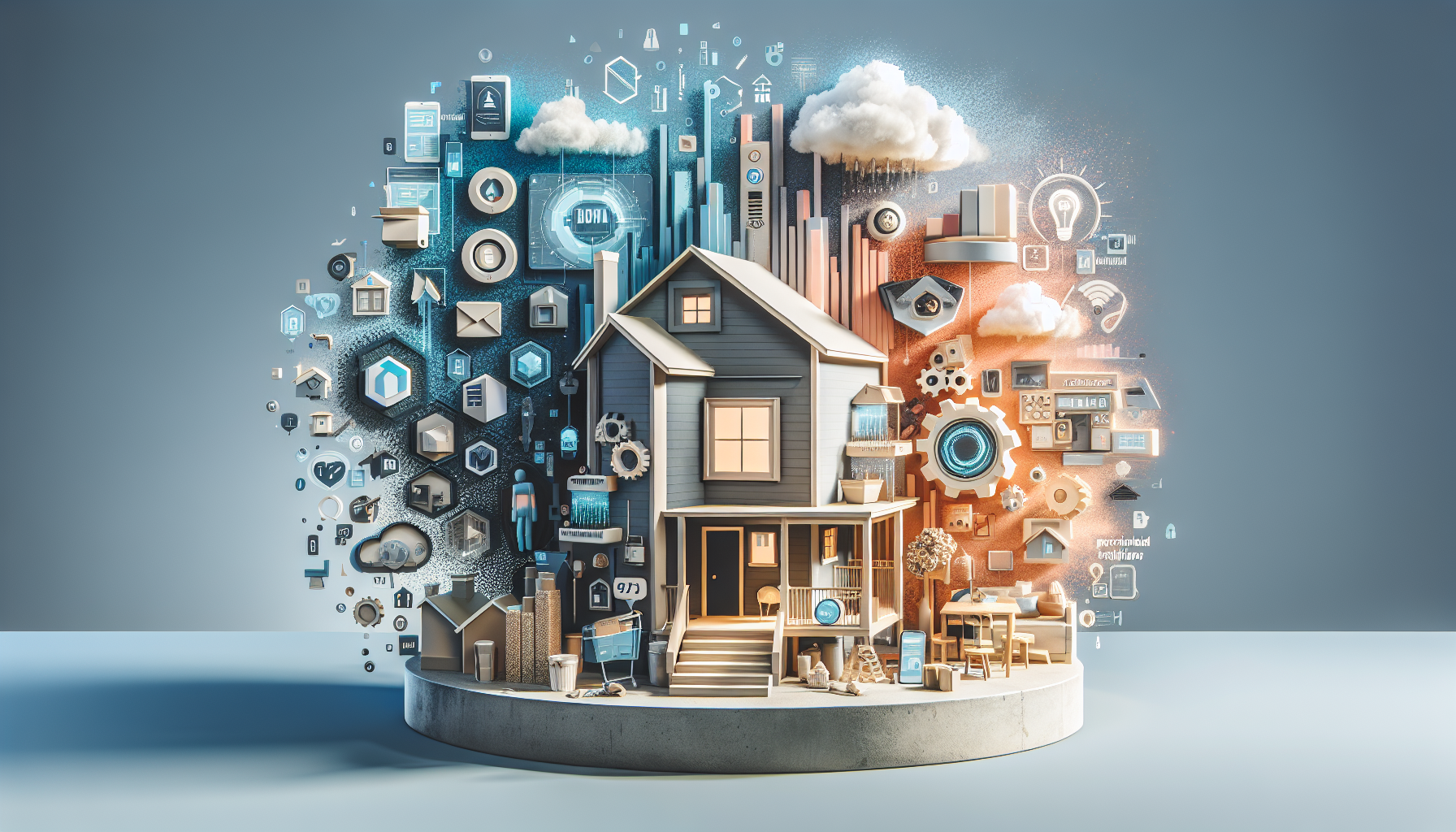Imagine transforming your home into a personalized sanctuary that perfectly complements your style and enhances your everyday life. Thanks to the data-driven revolution in home improvement, this dream is becoming a reality for homeowners worldwide. From smart thermostats that optimize energy usage to virtual reality tools that allow you to visualize renovations before lifting a hammer, the world of home improvement is leveraging data in unprecedented ways. So whether you’re a DIY enthusiast or prefer to leave it to the experts, get ready to embrace a new era of home improvement that is as efficient as it is exciting.

The Rise of Data Analytics in the Home Improvement Industry
The Increasing Role of Big Data in Home Improvement
In recent years, the home improvement industry has seen a significant rise in the use of data analytics to drive decision-making and enhance processes. The increasing accessibility to vast amounts of data, coupled with advancements in technology, has transformed the way home improvement projects are planned, executed, and marketed. Big data has become a game-changer, providing valuable insights and actionable information that can drive efficiency, cost optimization, and customer satisfaction in the industry.
Benefits of Using Data Analytics in Home Improvement
The adoption of data analytics in the home improvement industry brings forth several benefits. By leveraging the power of data, companies can gain a deeper understanding of customer preferences, needs, and behavior. This knowledge allows for the creation of personalized home improvement projects that cater to individual tastes and requirements. Additionally, data analytics enables companies to optimize design and planning processes by analyzing trends and industry insights, ensuring that projects are aligned with the latest market demands.
Data-Driven Design and Planning
Utilizing Customer Data for Personalized Home Improvement Projects
Data analytics allows home improvement companies to harness customer data and create personalized projects that resonate with individual customers. By analyzing demographics, purchasing patterns, and preferences, companies can tailor their offerings to meet the specific needs and desires of their customer base. This ensures that every project is uniquely designed to satisfy customer expectations, ultimately improving customer satisfaction and loyalty.
Analyzing Trends to Optimize Design and Planning Processes
In a rapidly evolving industry, staying ahead of the trends is crucial. By using data analytics, home improvement companies can identify market trends and customer preferences, enabling them to optimize their design and planning processes accordingly. Analyzing data on popular finishes, materials, and colors can help companies make informed decisions when creating design concepts for their customers. This not only ensures that projects are trendy and appealing but also reduces the risk of outdated designs.
Enhancing Customer Experience through Data Analysis
Leveraging Data to Understand Customer Preferences and Needs
Understanding customer preferences and needs is paramount in providing exceptional customer service. Data analytics offers valuable insights into customer behavior and enables companies to gain a holistic view of their customers. By analyzing data on past purchases, feedback, and browsing behavior, companies can anticipate customer needs and preferences, leading to a more personalized experience. This personalized approach fosters stronger customer relationships and increases overall satisfaction.
Using Data to Improve Customer Service and Satisfaction
Data analytics can significantly enhance customer service by enabling companies to identify pain points and address them proactively. By analyzing customer feedback and support interactions, companies can identify recurring issues and take steps to rectify them. Moreover, data analytics can help streamline processes, reducing waiting times and improving overall efficiency. By constantly monitoring and analyzing customer data, companies can continuously improve their service offerings and ensure high customer satisfaction levels.
Predictive Analytics in Home Improvement
Forecasting Consumer Behavior and Home Improvement Trends
Predictive analytics plays a crucial role in the home improvement industry by enabling companies to forecast consumer behavior and anticipate trends. By analyzing a vast amount of data, including social media trends, search queries, and industry reports, companies can identify emerging patterns and adjust their strategies accordingly. This allows them to stay ahead of the curve and offer products and services that align with future market demands.
Anticipating Maintenance and Renovation Needs through Predictive Analytics
Maintenance and renovation needs are essential aspects of homeownership. Predictive analytics can help homeowners and companies anticipate these needs by analyzing historical data and identifying patterns. By understanding the lifecycle of different elements in a home, such as appliances or roofing, companies can proactively offer maintenance or renovation options to homeowners. This enables homeowners to address potential issues before they become major problems, saving them time, money, and hassle.

Efficiency and Cost Optimization in Home Improvement
Reducing Waste and Project Delays through Data-Driven Decision Making
Data analytics can significantly impact the efficiency of home improvement projects by informing data-driven decision making. By analyzing historical project data, companies can identify patterns and potential bottlenecks, enabling them to optimize workflows and reduce waste. Additionally, data analytics can help companies forecast material requirements accurately, reducing the risk of overstocking or understocking. This not only improves overall project efficiency but also minimizes project delays and cost overruns.
Optimizing Budgets and Resource Allocation through Analytics
Budget optimization is a crucial aspect of any home improvement project. Data analytics can help companies optimize budgets and allocate resources efficiently. By analyzing historical project costs, companies can identify areas where budgets can be streamlined and resources can be optimized. For example, data analytics can provide insights into labor costs, enabling companies to allocate resources effectively and reduce financial waste. By leveraging data analytics, companies can ensure maximum return on investment and deliver projects within budget constraints.
Real-Time Monitoring and Home Automation
Utilizing Data Sensors for Real-Time Monitoring of Home Improvement Projects
The integration of data sensors into home improvement projects allows for real-time monitoring and feedback. By installing sensors that track project progress, temperature, humidity, and other relevant factors, companies can collect valuable data that enables them to monitor project performance in real-time. This data-driven approach allows for early detection of potential issues, ensuring prompt corrective actions and reducing the risk of project delays or failures.
Integrating Smart Home Devices for Enhanced Efficiency and Monitoring
The advancements in smart home technology have opened up a new world of possibilities for the home improvement industry. Integrating smart home devices into projects can enhance efficiency and monitoring capabilities. For example, smart thermostats can optimize energy usage, reducing utility costs for homeowners. Similarly, smart security systems can provide real-time surveillance and notifications, ensuring the safety and security of the home. By leveraging data from these devices, home improvement companies can offer enhanced solutions that provide convenience, cost savings, and peace of mind to homeowners.
Data Security and Privacy in Home Improvement
Challenges and Solutions for Protecting Homeowners’ Data
As data analytics becomes more prevalent in the home improvement industry, ensuring data security and privacy is paramount. Homeowners’ data must be protected from unauthorized access and potential breaches. This requires robust security measures, such as encryption, access controls, and regular system audits. Additionally, companies must adopt comprehensive data protection policies and educate employees on best practices for handling sensitive data. By prioritizing data security, companies can build trust with homeowners and maintain the integrity of their data.
Ensuring Privacy Compliance in the Collection and Usage of Home Improvement Data
Data privacy regulations, such as the General Data Protection Regulation (GDPR), dictate how companies collect, store, and use customer data. Home improvement companies must ensure compliance with these regulations to protect homeowners’ privacy rights. This includes obtaining informed consent before collecting and using personal data, informing homeowners about their rights, and providing options for data deletion or correction. By adhering to privacy laws, companies can demonstrate their commitment to ethical data practices and foster a trusting relationship with homeowners.
The Role of Artificial Intelligence in Home Improvement
AI-Powered Virtual Assistants for Home Improvement Guidance
Artificial intelligence (AI) is revolutionizing the home improvement industry by offering AI-powered virtual assistants that provide guidance and support throughout the project lifecycle. These virtual assistants can answer questions, provide design recommendations, and offer step-by-step instructions for DIY projects. By leveraging AI, homeowners can access expert advice and support, even if they lack extensive knowledge or experience in home improvement. This technology empowers homeowners to take on projects confidently and successfully.
Automated Home Improvement Solutions Powered by AI
AI also enables the development of automated home improvement solutions that streamline processes and enhance efficiency. By leveraging machine learning algorithms, companies can automate repetitive tasks, such as material estimation or project scheduling. This not only saves time but also reduces the risk of human error. Additionally, AI-powered systems can learn from historical data and continuously optimize processes, leading to improved project outcomes and customer satisfaction.
Data-Driven Marketing and Sales in Home Improvement
Targeted Advertising based on Customer Data
Data analytics plays a crucial role in marketing and sales by enabling targeted advertising based on customer data. By analyzing demographic information, purchase history, and online behavior, companies can tailor their marketing campaigns to specific customer segments. This personalized approach increases the likelihood of engagement and conversions, ultimately driving sales and revenue. Data analytics allows companies to understand customer preferences and pain points, enabling them to create compelling marketing messages that resonate with their target audience.
Leveraging Analytics to Optimize Sales Strategies
Data analytics also empowers companies to optimize their sales strategies by uncovering actionable insights from customer data. By analyzing sales patterns and customer behaviors, companies can identify the most effective sales channels, product offerings, and pricing strategies. This data-driven approach allows for continuous improvement of sales strategies, maximizing revenue potential. Additionally, by understanding customer preferences, companies can identify cross-selling or upselling opportunities, further increasing sales and customer satisfaction.
Collaboration and Data Sharing in the Home Improvement Industry
Improving Collaboration and Communication among Stakeholders through Data Sharing
Data sharing plays a vital role in improving collaboration and communication among stakeholders in the home improvement industry. By sharing project data, such as design plans, progress updates, and materials specifications, all parties involved can have access to accurate and up-to-date information. This promotes better collaboration, reduces misunderstandings, and ensures that everyone is working towards a common goal. With improved communication, projects can be executed more efficiently, resulting in enhanced outcomes and customer satisfaction.
Industry-wide Data Sharing Initiatives and Data Standards in Home Improvement
Recognizing the importance of data sharing, the home improvement industry has seen the emergence of industry-wide initiatives and data standards. These initiatives aim to establish common data formats, protocols, and platforms that facilitate seamless data sharing among stakeholders. By adopting standardized data practices, companies can reduce data integration challenges and improve interoperability. This industry-wide collaboration fosters innovation, efficiency, and improved project outcomes, benefiting both companies and homeowners alike.
In conclusion, the rise of data analytics in the home improvement industry is revolutionizing the way projects are designed, executed, and marketed. The increasing role of big data brings numerous benefits, including personalized projects, optimized design and planning processes, enhanced customer experiences, and cost optimization. Predictive analytics enables companies to forecast consumer behavior and anticipate maintenance and renovation needs. Real-time monitoring and home automation using data sensors and smart home devices enhance project efficiency and homeowners’ convenience. Ensuring data security and privacy, leveraging AI-powered solutions, and adopting data-driven marketing and sales strategies further optimize the home improvement industry. Collaboration and data sharing initiatives contribute to improved communication and project outcomes. With data analytics at the forefront, the home improvement industry is embracing the data-driven revolution, paving the way for enhanced efficiency, personalized experiences, and unparalleled customer satisfaction.

